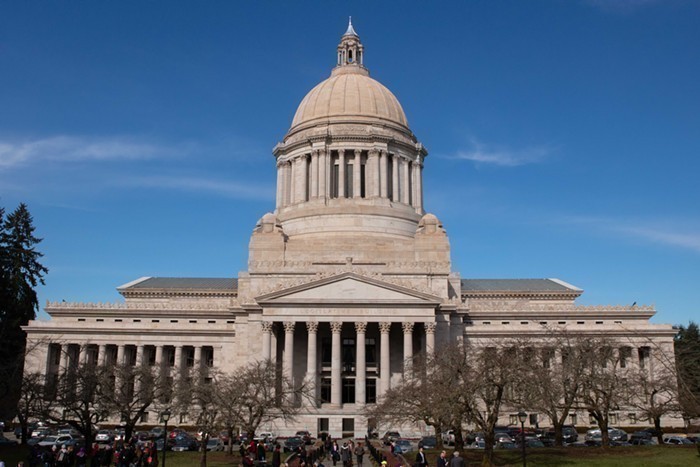
On the last day of session, Sen. Reuven Carlyle announced the death of the Washington Privacy Act (WPA).
The WPA was one of the biggest priorities for the Democrats this year, a major piece of legislation that would have secured some of the strongest data protections in the world for internet users in Washington. But House and Senate leaders couldn't work through their disagreements during a meeting on Thursday.
As I reported last Friday, which at the moment seems like years and years ago, the House and the Senate were debating two similar proposals.
Both versions would have given Washingtonians the right to ask large tech corporations to edit, correct, delete, or stop selling their data, and those corporations would have had to make an effort to fulfill that request.
There was also a facial recognition component to both bills, but during conference today the two sides agreed to axe that language and stuff it in another facial recognition bill sponsored by Sen. Joe Nguyen. He worked with Rep. Debra Entenman, and both agreed to implement some warrant requirements and legislative notification when cops use facial recognition, and now the House will vote on the compromise in a matter of moments.
The major remaining difference between the two proposals, then, was the enforcement mechanism.
The House's version would have allowed the Attorney General's office and any other Washingtonian to sue the big tech companies under the Consumer Protection Act if those companies failed to respond reasonably to a request.
The Senate's version would only allow the Attorney General's office to fine companies if they violated the law, but without the ability to use the Consumer Protection Act.
Big tech companies and the Seattle Times Editorial Board backed the Senate's version. Every consumer protection group you can think of, including the Attorney General's office, backed the House's version.
In a statement, Sen. Carlyle, who sponsored the Senate's version, said he still thinks his idea is the most "responsible policy and a more effective model than the House proposal to allow direct individual legal action against companies." Though big tech companies appeared to be breathing down his neck, his experience as a "tech entrepreneur who has worked in multiple startup companies" also informed his decision.
Rep. Zach Hudgins, who was pushing the House's version, said that some big tech companies (Microsoft and Apple) ended up coming around during negotiations, but ultimately both sides couldn't reconcile their differences.
Hudgins said his side offered to make the consumer case harder to take to court, which Carlyle was receptive to, but then business community "became unglued" on him and he backed off. House negotiators were also willing to delay implementation in order to collect more data on who sues who and for what, but Carlyle's side wasn't having it. "That's where it ended. He did not want consumers to be able to enforce their rights in any way," Hudgins said.
Both lawmakers recommitted to working on the proposal again next year.
So did consumer protection groups. "We appreciate the robust debate on this critical issue," said ACLU Washington spokesperson Jennifer Lee. "We are thankful to our House members for hearing the voices of communities and consumer advocates and setting a high standard for strong data privacy protections. We are committed to working with stakeholders to ensure that Washington state residents are afforded with every opportunity to protect their data and their economic and social wellbeing."



















